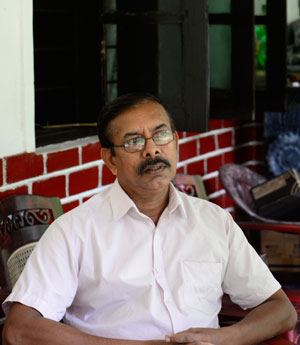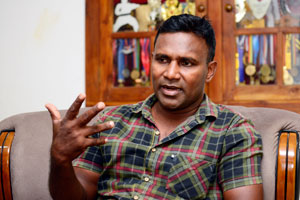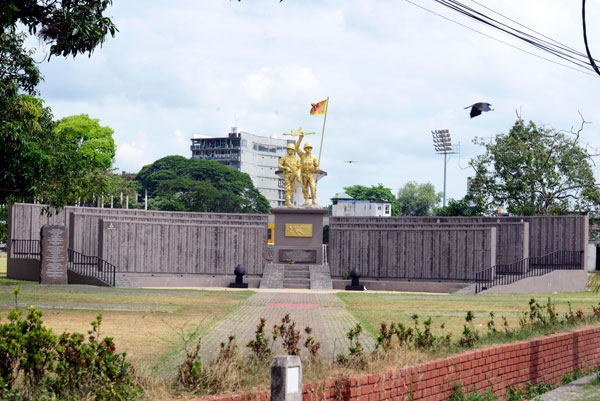News
Once they fought for the country, now they have to battle over fair share of Api Wenuwen Api, audit reveals
View(s):- The Ministry of Defence denied any favouritism in the disbursement of funds
By Mimi Alphonsus and Dilushi Wijesinghe
The ‘Api Wenuwen Api’ fund which provides housing support for veterans of the civil war neglected eligible candidates, a government performance audit has found.
Many disabled soldiers and families of those killed in action have been overlooked, while support has gone to lower-priority cases, the audit says. Over 23,000 soldiers died and many were disabled during the civil war.

Sunil Welgama - One of the 1810 who did not receive funding and awaiting assistance, according to the Ranaviru Seva Authority. He has now built his house with a loan.
Rasika’s [name changed] 24-year-old unmarried son was killed in action in 2008 and her husband has since passed away. She lives in a rented house in Kurunegala and has applied for housing assistance with the Ranaviru Seva Authority. She is on a waiting list and is yet to receive anyfunds. “I have sent so many letters and submitted so many applications,” said Rasika, in tears, “I have been trying with no success for 15 years.”
Due to structuralissues with beneficiary selection and blatant misallocation of resources, people like Rasika haveslipped through the cracks. Api Wenuwen Api, which was started in 2008, disbursed Rs. 3.9 billion in 15 years to 3,612 beneficiaries. It is primarily funded through donations, interest earnings, and telecom tower revenue.
Candidates apply through their respective branches–army, navy, airforce, police–which then create priority lists to give to the Api Wenuwen Api board for final approval. Because details about the fund, application process, and disbursements are handled internally by security force branches and their welfare boards, currently serving officers are more likely to find out about the facilities that are available. Meanwhile, retired officers and their families are often unaware and miss out on applying.
Consequently, active service personnel disproportionately benefited from the fund with 71% of Api Wenuwen Api beneficiaries being current personnel–that is, they were neither killed during the war nor debilitatingly disabled. Only 885 out of 3,612 beneficiaries between 2010 and 2023 had either a major war-related disability or had been killed in action, the audit revealed.
The audit records multiple instances where veterans in uninhabitable living situations tried to get support, applying to both the Ministry of Defence mobile services and Ranaviru Seva Authority, with no success. But because they were unaware of Api Wenuwen Api specifically–even 16 years after it was set up–they never applied. “Proper communication has not been ensured to provide equal and fair opportunities for all eligible beneficiaries of the Fund,” the audit concluded.
As of January 2023, 1,810 people identified by the Ranaviru Seva Authority as recommended for assistance have been unable to receive it, the audit revealed.
The Ministry of Defence told The Sunday Times in a written response that to resolve the issue “awareness initiatives are being planned through Divisional Secretariats, Grama Niladhari officers, and the respective military regiments.”
Though many were excluded due to the fund’s flawed selection process, in some cases, Api Wenuwen Apifavoured lower-priority applicants over more deserving ones.

Anura Thissa Kumara, a retired Warrant Officer
In 2020, out of 315 army personnel recommended for priority assistance by the Army Welfare Directorate, only five received support. Instead, the Api Wenuwen Api board gave money to 45 soldiers who were not on the priority list. In the same year, three out of 13 police officers and four out of seven naval officers were granted funds despite not being on any list.
“Parties who were killed, fully disabled, or partially disabled while engaged in operational duties did not receive priority in the provision of the Fund’s benefits,” the audit concluded. “More attention was paid to providing benefits to serving personnel.”
High ranking officers–including Brigadiers–were granted funds for improvements to existing multi-storied homes, while lower ranking officers without even a basic home were overlooked. In one instance, a Lieutenant Colonel was granted housing assistance to build a four-story, 4,940 square foot house, despite already owning other housing units.
The 2020 priority list for naval officers submitted by the Naval Welfare Director listed 123 candidates, ranking them by seniority rather than housing need. “It is a commonly known fact that high-ranking officers are given preference for benefit schemes,” said Anura Thissa Kumara, a retired Warrant Officer who served during the war, “but anyone who goes to ask questions about this immediately gets noted.”
The Ministry of Defence denied any favouritism in the disbursement of funds.
Apart from issues with prioritisation, the audit also pointed to shortcomings in maintaining records, verifying eligibility, and preventing duplicate support. Nishanka Kumara, a corporal who served in the army since 2003 said that he applied to the Api Wenuwen Api fund in 2012. He was finally approved, but by then had built his house through funds from the Ranaviru Seva Authority.

Remembering the fallen: The war memorial in Kurunegala. Pix by Indika Handuwala
“When Api Wenuwen Api wanted to finally give me the money I decided to be honest because I had since managed to build my house,” said Kumara. “I told them to give it to someone else who needs it.” But the audit found multiple instances where beneficiaries had been doubly supported by Ranaviru Seva Authority and the Api Wenuwen Api fund, despite this making them ineligible.
The disbursement of funds, too, was an issue. The Api Wenuwen Api board desposited funds to common accounts of the triforces and police, and did not keep direct confirmations of whether the individual beneficiary actually received the money.
A board headed by the Secretary of Defence manages the Api Wenuwen Api fund. Board members include a deputy governor of the central bank, a member of the Faculty of the Postgraduate Institute of Management of the University of Sri Jayewardenepura, a member of the Institute of Chartered Accountants, and two members appointed by the Minister of Defence. This board is currently responsible for over Rs. 1.7 billion.
The Sunday Times spoke to members of current and past boards who knew little about the beneficiary selection process or indeed the members’ exact role.
The best way to say that you found the home of your dreams is by finding it on Hitad.lk. We have listings for apartments for sale or rent in Sri Lanka, no matter what locale you're looking for! Whether you live in Colombo, Galle, Kandy, Matara, Jaffna and more - we've got them all!

